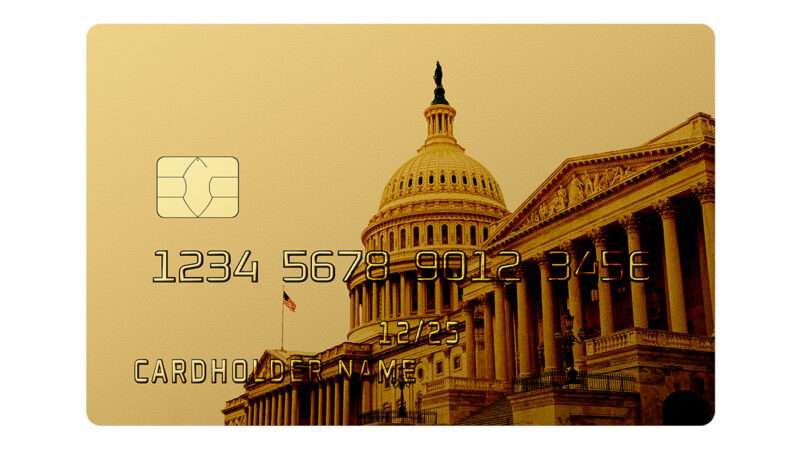
A plot to kill credit card reward points has bipartisan buy-in, with lawmakers framing the effort as an attempt to curb still-stubborn inflation.
Don't bank on it.
Sens. Dick Durbin (D–Ill.) and J.D. Vance (R–Ohio) are two of the leading sponsors of the Credit Card Competition Act, which would artificially cap so-called swipe fees charged by credit card companies such as Visa, Mastercard, and American Express. Those fees, which range from about 1.2 percent to over 3 percent of the transaction, cover the credit providers' overhead costs, including fraud protection. They also fund the reward programs that many credit cards now offer as consumer incentives, where every dollar spent translates into points that can be redeemed for flights, free stuff, or cold hard cash.
Even though swipe fees amount to just pennies on the dollar, they add up to big bucks fast because Americans use their credit cards a lot—150 million times per day in 2022. All those swipes allowed Visa and Mastercard, the two networks that handle the majority of transactions, to collect more than $93 billion in fees that year, according to the senators pushing the reforms.
Durbin, Vance, and other advocates for limiting swipe fees argue those higher costs are ultimately passed on to consumers. They're probably right about that. But their proposal, which would cap those fees and give the Federal Reserve the power to force credit card companies to change how rewards programs are structured, seems likely to cause unintended consequences that will backfire on the very consumers they are aiming to help.
That's not a theoretical fear. It's exactly what happened after Congress imposed similar limits on debit card swipe fees as part of the Dodd-Frank Wall Street Reform and Consumer Protection Act, the major overhaul of financial regulations passed in 2010.
As part of that law, fees charged on debit card payments were capped. Within the first year, average fees fell from 44 cents to 24 cents per swipe. In response, banks largely did away with debit reward programs and other consumer benefits such as free checking accounts.
Ultimately, both consumers and merchants lost. A 2013 study by three economists at the University of Chicago found that merchants saved $7 billion annually from the elimination of fees, but those savings were not passed onto consumers. Instead, "consumers lost more on the bank side than they gained on the merchant side" and ended up losing more than $22 billion in potential benefits.
A 2022 study by researchers at Georgetown University and Yale Law School found the collapse of debit card rewards programs nudged consumers to use credit cards more often—credit cards that charged higher swipe fees, thus undercutting merchants' savings from capping debit card fees.
The mastermind behind that provision of the Dodd-Frank law? None other than Durbin, who is now leading the crusade to repeat his own mistake.
The post Congress Could Swipe Your Credit Card Reward Points appeared first on Reason.com.







